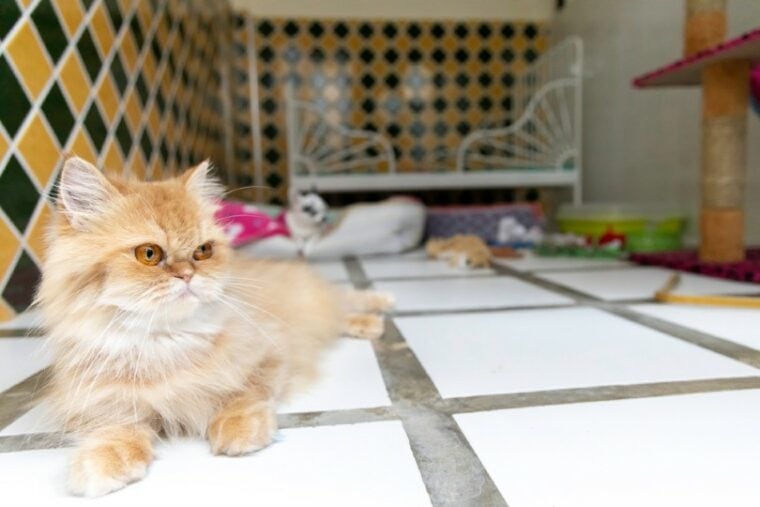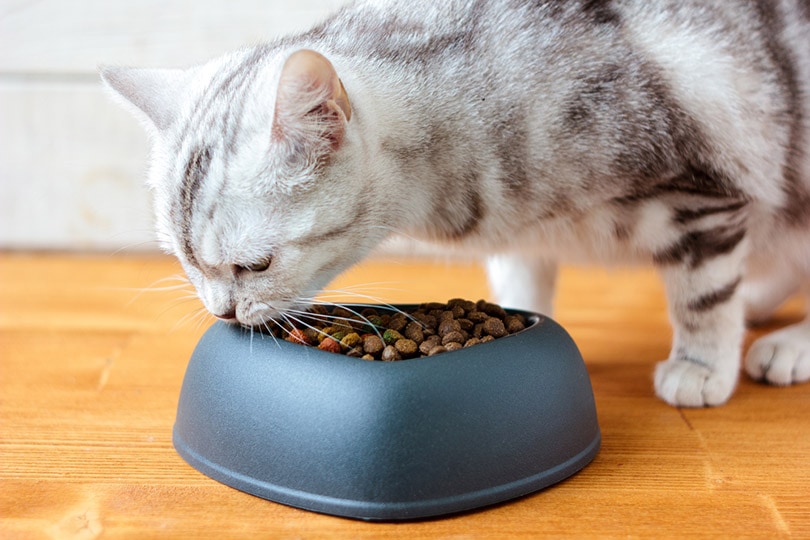
Click to Skip Ahead
Going away without your pets occurs at some point in any pet owner’s life. Emergencies or circumstances might dictate that you have to leave your cat behind, and leaving them with a cattery is a good option. However, like anything, there are pros and cons to leaving your cat in a cattery. In this article, we’ll look at the pros (in the first section) and the cons (in the second section) of boarding for cats and answer the commonly asked questions below.
Pros
1. It Gives Them Company
Despite cats generally being solitary animals in the wild, many pet cats enjoy playing with other felines. Confident cats or cats that were socialized and raised in a multi-cat household are less likely to suffer from loneliness if they’re left in the home by themselves, so the busy environment of a cattery might suit them perfectly.
Employees will be checking on your cat, spending time with them, and playing with them in a cattery, and cats from the same household are often paired together to socialize.

2. It Ensures They’re Not Left Alone
With cat sitters, your cat is usually left alone for at least a few hours when the cat sitter isn’t there. In a cattery, your cat will always have company. Cattery staff are often only away for a few hours overnight, but some stay overnight if cats in their care require it.
Most of the day, your cat will have people around to manage and care for them, so you know they’ll be under a watchful eye. This alone can be a great comfort to you, and it gives you peace of mind that someone is there for them if something happens.
3. They Get a Routine
Catteries are often run with a strict routine. The time for food, play, and care are all scheduled to ensure the smooth running of the facility, so your cat will be able to take some comfort from knowing what to expect. Cats are creatures of habit and thrive on routine, so they should be able to relax and anticipate different stages of their day after a few days in the boarding house.

4. They Are With Professionals
Catteries normally employ staff that are experienced in pet care, as well as relationships with veterinary professionals. If there aren’t feline specialists in the building, the staff will have a care plan if one of the cats in their care becomes ill. The best catteries have experienced employees, and ensuring your cat is happy and comfortable should be their top priority.
5. You’ll Get Updated on Their Care
Catteries often have social media pages or ways to keep in contact with you, so you can get updates on how your cat is doing. Some even produce a sort of diary for your cat, detailing what they’ve been up to and how they got along. Receiving pictures of your cat during their stay has become commonplace now, which is another way you can be reassured that your cat is being taken care of. This works the other way, too, as you can call the cattery during staffed hours, and there’ll always be someone there to update you on your cat!

Cons
6. It’s Expensive
The price is one of the biggest cons of keeping your cat in a cattery. The cost of using a cattery can vary wildly from location to location, and the length of your pet’s stay will determine the final cost.
Some catteries offer block bookings or additional luxuries. Depending on the location and size, some facilities have “spa” treatments for cats that include grooming procedures and other pampering treatments. However, these services can be expensive! Be aware that some catteries might charge extra for basic services, such as administering food (if you don’t pack your own) or medication.
7. Your Cat Is Away From Home
Generally, most cats would prefer to stay at home if they could while you’re away. Cats are territorial, like routine, and don’t deal with disruption very well; staying in a cattery can be a very stressful experience for some cats since it’s so disruptive.
Different smells, sights, and sounds can all cause stress, and more timid or nervous cats can have problems staying in a cat hotel or cattery.

Some catteries might have individual rooms for their cats, but many place their felines in communal spaces. Sharing a room might include shared facilities, beds, scratching posts, toys, and hiding places. These items may all have been used by cats previously staying at the cattery, and many scents can be present at once. Your cat will have to learn to live with a strange cat in a kennel space very quickly, which can be challenging.
9. Different Food May Be Fed
Usually, cat owners provide food for their pets. However, some catteries provide their own food (particularly “luxury” meal options), which could upset your cat’s digestive system. Any sudden changes to your cat’s diet can cause gastrointestinal distress, including vomiting or diarrhea. You should mention any food allergies before your cat starts their stay, and you should ensure the cattery knows how much to feed your cat.

10. Some Are Better Than Others
Unfortunately, some catteries are better than others. Some are completely focused on the cats in their care and are well-reviewed, while others are less so. Doing your research, getting recommendations from vets and other cat owners, and perusing reviews are crucial to finding a cattery that suits you. You should also visit the cattery before your cat’s stay. Doing your due diligence and checking the place out can help you weed out any suspicious facilities.
What Makes a Good Cattery? How Do I Know Which One To Choose?
When considering choosing a cattery, doing your research first is the key. Do you want your cat to have their own space, or is your cat okay to share? Do you need any medications to be administered to them? With this in mind, search reviews of catteries and visit the ones you’re interested in.
Depending on the state that you are in, a license may be required to run a cattery so check to see if these are available to view.
You should be able to talk to the cattery manager to determine whether the staff are trained and who will be looking after the cats if the manager is away. It’s also vital to find out the procedure for cats that get sick and see whether your cat needs any special preparations made before they’re boarded (such as vaccinations).
Catteries should be open to your questions and willing to show you all areas of the building. Feel free to run through a checklist in your head (or even in your hand) about what your cat needs and what you’d want for them. Ask the staff what they’d do in a hypothetical situation (what happens if my cat gets sick?) and check for parameters such as pen cleanliness and recreation.
Lastly, make sure you’re familiar with the pricing structure. Most catteries have a daily fee for boarding, and some will offer block bookings. Any additional extras, such as meals provided or toys, will cost more.
What Are the Alternatives to Boarding My Cat?
If you don’t want to place your cat in a cattery, there are some alternatives you can consider. Hiring a cat sitter is nice since they visit your home and allow your cat to stay in their environment. You could also ask if your cat could stay with a friend or relative, but there could be big problems if they already own a cat!
Cats can travel with their owners to some places, and you can consider taking your cat with you. We would not recommend leaving your cat home on their own in any circumstances. If something goes wrong, such as your cat getting ill or injured, or if they finish their food or water, they are at serious risk of harm or death.
Conclusion
Deciding to board your cat can be a stressful experience, but adequate preparation and considering all the pros and cons can help you find the cattery most suitable for your pet. Some of the cons are unavoidable, but many can be mitigated if you plan accordingly and consider your cat’s needs. Above all, ensuring your cat is cared for in a safe and comfortable environment is the most important aspect of boarding your pet.
Featured Image Credit: Bussakorn Ewesakul, Shutterstock






